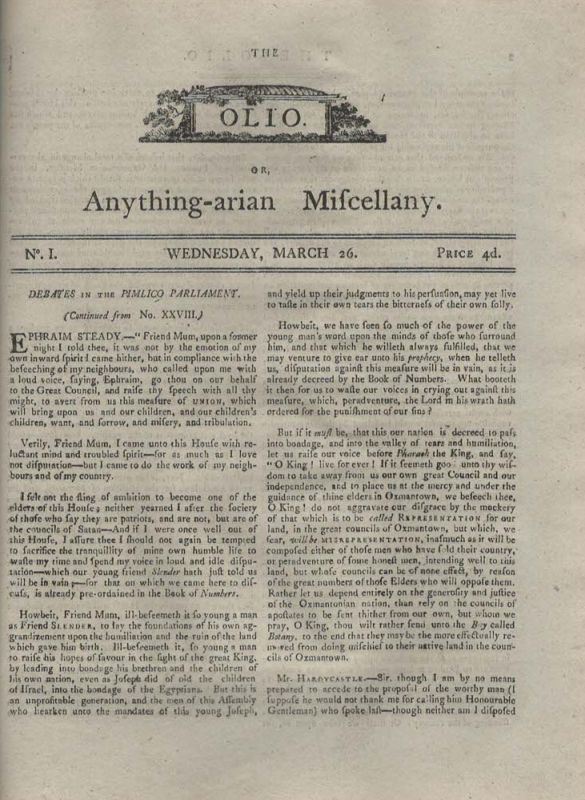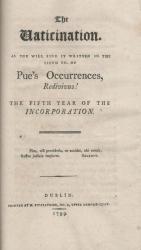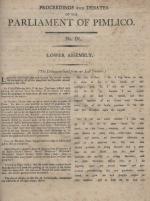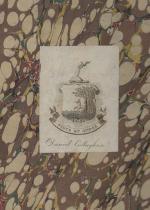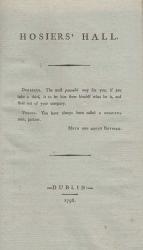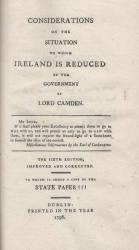[Dowling, Irish Tracts - Sammelband of important Tracts, Pamphlets and Periodi
Sammelband with important original Works by Vincent Dowling and other writers / Satirical Tracts, Satirical Pamphlets and Satirical Periodicals of 18th century Ireland. A stunning and very rare Collection from the Library of Daniel Callaghan, Esq. of Lotabeg, MP for Cork. The Volume includes: I. [Anti-English Satirical Periodical by Vincent Dowling – 25 (of 34) Issues of one of the most important satirical periodical of 18th century Ireland, called “Collection of Proceedings and Debates of the Parliament of Pimlico – In the Last Session of the Eighteenth Century. [Dublin], Published by the Executors of Judith Freel and sold by all Flying Stationers” [see detailed Bibliography and Pagination below], [1799-1800]/ II. Continuation of the Periodical happened under the Title “The Olio or Anything-arian Miscellany”, of which issues No.I – No. V are bound after (The titlepage of No. I of the “Olio” states: “Debates in the Pimlico Parliament (Continued from No.XXVIII)” [which means these five issues bring the tota l of the periodical to 30 (of 34)] / III. S.P.Bluddengutz (Pseudonym) / Anonymous: “The Vaticination – As you will find it written in the 110th No. of Pue’s Occurences, Redivivus ! – The Fifth Year of the Incorporation” – Dublin, Printed by Fitzpatrick, 1799. 16 pages / IV. [Lord Camden] – “Considerations on the Situation to which Ireland is Reduced by the Government of Lord Camden” – The Sixth Edition, Improved and Corrected. To which is added a copy of the STATE PAPER !!! – Dublin, Printed in t he Year 1798 – 34 pages / V. Roger Gower / Anonymous – “Hosier’s Hall” [an address to Lord Cornwallis, by the Corporation of Hosiers of Dublin, with his reply, and an attack on it by Roger Gower, clerk of the Corporation] – Dublin, 1798 – 14, [1] pages. [with printed NOTE at the end of this pamphlet stating:″The foregoing Notice should have appeared sooner, but Faulkner’s Journal refused to receive it” //
[Dublin], Flying Stationers [Dowling] / M.Fitzpatrick / 1799 – 1800. Quarto. Pagination: “Parliament of Pimilico”: 100 pages / “Olio”: 40 pages / “Vaticination”: 16 pages / “Considerations”: 34 pages / “Hosier’s Hall”: 14, [1] pages. Private half – leather with gilt lettering on spine. Wonderful binding with marbled papaer-covered pastedowns and endpapers. The armorial bookplate of Daniel Callaghan, Esquire of Lotabeg (County Cork) to the pastedown with his Motto: “Fidus et Audax” / Endpapers and first four pages with minor wormhole-damage. The Volume overall in excellent condition !
The Vincent Dowling – Sammelband Contents:
1. Parliament of Pimlico – Pagination: No.I – “Advertisement”, 4 pages / No. II – “House of Nobs”, 4 pages / No.III – “Lower House – Die Stephani 1799”, 4 pages / No. IV to No. XX all titled – “Lower Assembly” [in which the Debates are always continued from the previous Number” (each issues have 4 pages) / No.XX to No. XXV all titled “House of Nobs – Die Joannis, Die Mercurii, Die Martis etc. 1800”, followed by Issue XXVIII – “House of Nobs – Die Martis, 1800” (Issue No. XV, Issue No. XXVI and No. XXVII seem to be missing but were never bound with this Volume, also missing are Issues No. XXIX – XXXIV]
2. “Parliament of Pimlico continued” after Issue XXVIII under a different titel “″The Olio or Anything-arian Miscellany” of which five issues follow the first 25 issues bound in this Sammelband. Pagination: 40 pages.
Dowling, Vincent (1756–1825), parliamentary reporter and satirist, was born in Queen’s Co. (Laois); there are no details of his parents. He began his long and successful journalistic career in Dublin in the 1780s, where he became a parliamentary reporter, memorising speeches and writing up the text for the newspapers. Moving to London temporarily, he returned to Dublin in the 1790s. In 1797 he began the Apollo circulating library at 13 Suffolk St., Dublin. A lifelong bibliophile, Dowling ran the library for three years, latterly at 5 College Green. Vigorously opposed to the legislative union of Great Britain and Ireland, he applied his considerable wit and writing talents to attacking the measure. Although against its abolition, he nonetheless satirised the Irish house of commons in his Proceedings and Debates of the Parliament of Pimlico. This famous publication ran to twenty-eight issues (1799–1800), and poked fun at the ‘house of nobs’ and the foibles of politicians. He also published a periodical, The Olio, or Anythingarian Miscellany. Disillusioned after the passing of the union, he left Ireland in 1801 and returned to London, where he became a bookseller and patent medicine vendor at his premises at 30 Lincoln’s Inn Fields. He later returned to journalism, and worked for The Times, moving house to Salisbury Square.
His wit and malicious sense of humour were renowned; perhaps his most significant prank occurred after the death (1816) of Patrick Duigenan (qv), the controversial lawyer and politician. Dowling wrote a detailed account of ‘The melancholy circumstances of the last moments and death of Dr Patrick Duigenan, MP’, which he sent to his godson in Dublin who published it in the Dublin Journal. The article speculated that Duigenan had converted to catholicism on his death-bed, an extraordinary volte-face for the extremist defender of protestantism. The story was impossible to disprove, although John Giffard (qv) denied it vehemently.
Dowling lived in London for the remainder of his life, in affluent retirement at his Kentish Town house. He died there on 29 March 1825. He married, and had two sons; both of whom achieved some distinction in England. Vincent George Dowling (1785–1852) was a prominent journalist, the author of Fistiana, or The oracle of the ring, a history of boxing, and was also editor of Bell’s Life, the sporting newspaper, from 1824 until his death. He was present in the house of commons on 11 May 1812 when John Bellingham shot the prime minister, Spencer Perceval, and was one of the first people to apprehend the assassin. The second son, Sir James Dowling (1787–1844), also pursued a career in journalism, becoming a parliamentary reporter in London, followed by a successful career as a colonial judge. (Source: DIB – Dictionary of Irish Biography)
Provenance of the Volume: Daniel (Dan) Callaghan (1786–1849) was a prominent businessman and Irish politician who served as MP for Cork City from 1830 to 1849 (1830-1832 as a member of the Whig Party; 1832-1849 as a member of the Irish Repeal Association). As a member of the Repeal Association, Dan Callaghan sought to end the Act of Union (1800), which created the United Kingdom of Great Britain and Ireland. Callaghan, along with other Irish MP’s like Daniel O’ Connell, opposed the introduction of the Poor Laws (Ireland), which established the Victorian workhouses to Ireland. (Wikipedia)
- Keywords: Act of Union (Ireland 1800) · Catalogue Irish History Two – Origins of Irish Identity · Dowling, Vincent (Satirist) · English History – Rare · Irish History – Rare · Irish History in the 18th century · Irish History in the 19th century · Periodicals · Periodicals Rare · Satire
- Inventory Number: 31753AB
EUR 1.800,--
© 2025 Inanna Rare Books Ltd. | Powered by HESCOM-Software




